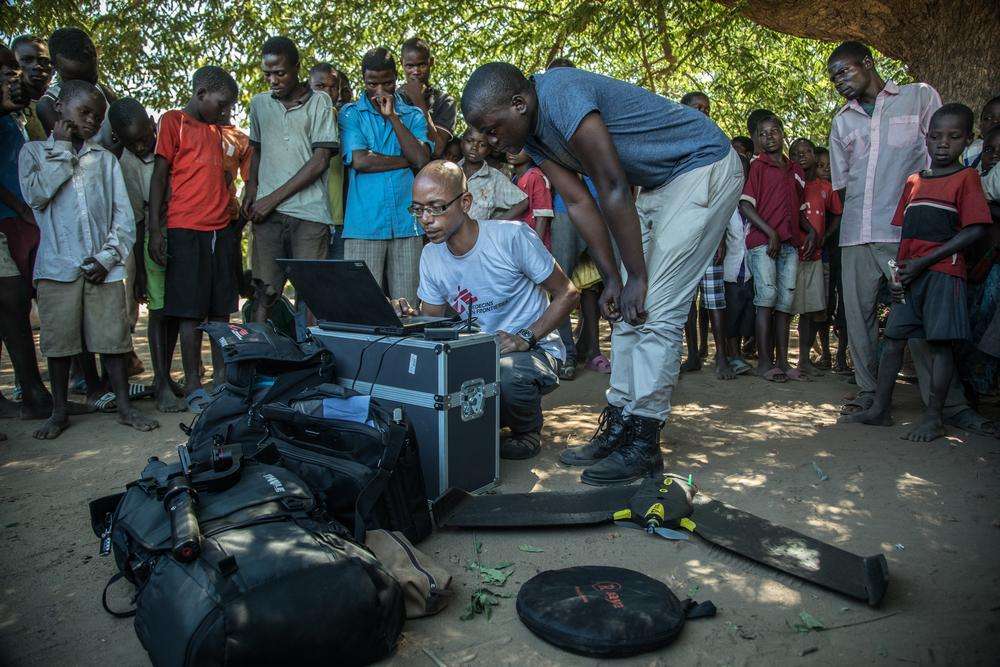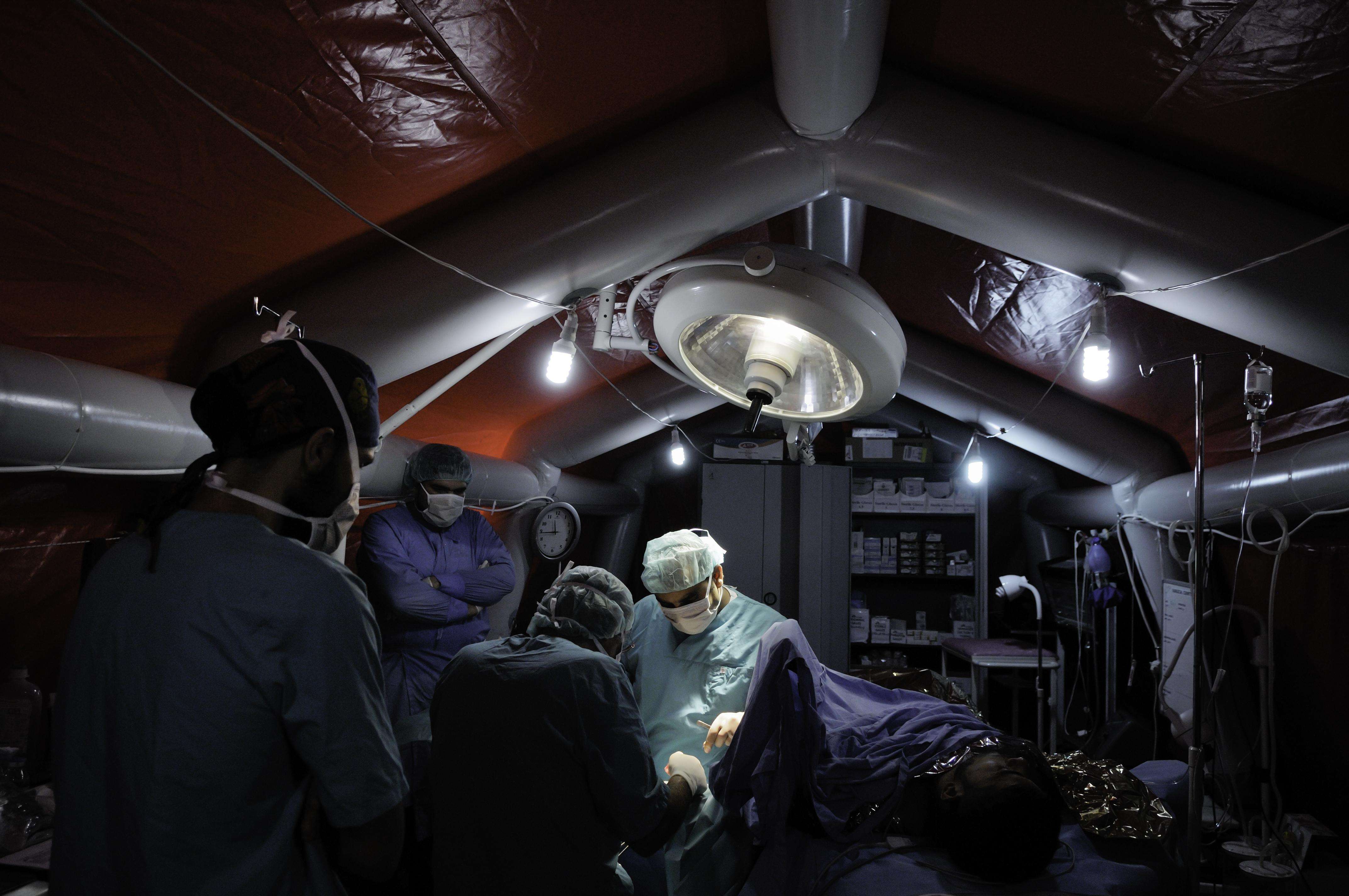Aweil General Hospital, in a remote corner of South Sudan, serves some 1.5 million people who would otherwise have very little access to quality health care. But a lack of trained medical professionals and basic diagnostic tools complicates matters. Medical personnel generally rely on observed and reported symptoms—and a certain amount of educated guesswork—to make a diagnosis.
“Pneumonias are one of the leading causes of mortality worldwide, especially in children. But because of a lack of useful diagnostic tests, we use a broad definition to avoid missing any patients with this illness,” said Adi Nadimpalli, former MSF-USA Board vice president and a physician with wide-ranging experience working on MSF projects from South Sudan to Syria. “So currently, most children with a cough or difficulty breathing are diagnosed and treated as having pneumonia, even though there are multiple diseases which can present similarly.”
If an X-ray is needed at the hospital in Aweil, it’s a bumpy 15-minute drive along an unpaved road to the nearest working machine. “The risk of transporting an unstable child is frequently too high, even if it can get us additional clinical information to guide the proper treatment,” said Nadimpalli.
A “TECHNOLOGY REVOLUTION”
To address these limitations, MSF’s Transformational Investment Capacity (TIC) initiative is funding a project to implement point-of-care ultrasound (POCUS) in the field. “There has been a POCUS technology revolution over the last decade,” says Nadimpalli, project coordinator for the grant at MSF-USA.
Older ultrasound machines were large, expensive, and complex, meaning only experts like radiologists, cardiologists, and obstetricians were trained to use them. But newer models are highly portable, affordable devices that can be connected to tablets to display images. Just as importantly, the simplification of medical algorithms (the steps and criteria for evaluating POCUS images) means that general clinicians at all levels can learn basic ultrasound skills.
This potent combination of factors now makes it possible to deploy POCUS technology in the most remote locations. The project launched at the start of 2017 with a feasibility study in Aweil hospital, where MSF runs the pediatric and maternity departments in cooperation with the Ministry of Health. “The barren landscape for health care in Aweil made it the ideal location to trial this initiative,” said Stephanie Mayronne, the medical operations manager for South Sudan based in New York.
“We wanted to show we could teach our South Sudanese non-doctor clinical staff how to use ultrasound with a simple protocol at high accuracy,” said Nadimpalli, who trained and assessed six clinical officers in Aweil over six weeks. The training focused on pulmonary diagnosis. “A large burden of disease for our patients is bacterial pneumonias, tuberculosis, and unrecognized heart diseases, especially rheumatic heart disease.” Recent advancements in POCUS algorithms have allowed clinicians to use the technology to diagnose these pulmonary pathologies, yet significant gaps remain. “Ultrasound algorithms need to incorporate the realities of our patients living in low-resource settings,” said Nadimpalli.
According to Nadimpalli, ultrasound also needs to be integrated into daily medical practice. “There was a child in the tuberculosis ward who had excessive fluid in his chest,” said Nadimpalli. Without POCUS, a clinician would normally use finger-percussion to determine where the fluid was and then insert a needle at that spot to remove this fluid. “You tap the chest wall to see if you can ‘hear’ where the fluid is—it has been done like this for decades,” he said. Using POCUS has been shown to improve safety and decrease errors for this procedure.
EMPOWERING LOCAL STAFF
The feasibility study was successful and Nadimpalli returned to Aweil earlier this year for the second stage of implementation. “Now we are going back to basics: basic ultrasound skills, basic obstetrics, basic trauma, abscesses, and, for those with advanced skills, basic cardiac ultrasound,” said Mayronne. POCUS can help sharpen the diagnosis of basic trauma injuries too.
“The POCUS initiative is specifically focused on increasing clinicians’ ability to make bedside diagnoses,” said Mayronne. “We want to empower our local staff.” Four South Sudanese midwives will also receive training. Previously, ultrasounds were performed by the hospital’s ob-gyn or the midwife supervisor, positions typically held by international staff. “Now, South Sudanese midwives will also be able to utilize POCUS—a huge asset in a hospital that delivers 400 babies per month,” said Mayronne.
Continuing education will be an important component to the success of POCUS. “As we train our staff, we want to make sure they continue to develop their skills and that they are properly updated on new protocols,” said Nadimpalli. “We are promoting key people in each project who can be ultrasound leaders.” The project will also use telemedicine to stay connected with the team in South Sudan, help develop skills, and rapidly identify any deficiencies that may require additional training.
FAR-REACHING EFFECTS
The use of POCUS in Aweil is already having an impact. “One of our maternity patients was admitted with shortness of breath,” said Nadimpalli. “We needed to send her ultrasound to telemedicine, where a cardiologist diagnosed her with mitral stenosis.” Mitral stenosis, a heart disease that is incredibly dangerous for women, has a mortality rate of 50 to 60 percent. That rate increases with each pregnancy.
After discussion with MSF obstetric and anesthesiology referents in Paris, it was determined that the patient should have a Caesarean section and a tubal ligation for permanent contraception. However, this was only her second pregnancy, and not being able to have more children is a difficult decision in South Sudan, where large families are the norm. “Because of the ultrasound, we could confidently discuss with the patient, her husband, and her father the need for surgery and contraception—explaining that she may not survive another pregnancy,” said Nadimpalli. “In this instance, the use of ultrasound was truly lifesaving.”
Based on the experiences and lessons learned in South Sudan, MSF hopes to rapidly expand the technology and training to other projects around the world.






